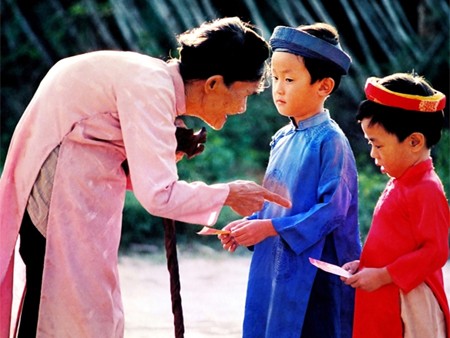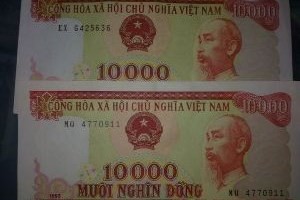“Li xi” is a little new money put in a red envelope. No one knows exactly when and how the “Li xi” custom began. A legend says that once upon a time, evil spirits living in tree hollows always wanted to harass people but were prevented by the gods. However, on New Year’s Eve, when the gods had to come back to heaven to accept new tasks assigned by the Chief God, the evil spirits went out and rubbed children’s heads, making them ill or crazy. Once when several gods were passing by a house, they transformed themselves into coins next to the babies. The coins were then covered by a piece of red cloth by the parents. When the evil spirits came, the coins brightened and scare them away. So coins wrapped in red cloth were believed to keep children safe from evil. Another legend says the “li xi” custom originated in China’s Tang dynasty. After Yang Guifei gave birth to a prince, the King gave the new-born gold and silver in a red cover as an amulet to ward off evils.
 |
| “Li xi” or giving lucky money is one of the most anticipated Tet customs, especially by the children. (Photo: dantri.com.vn) |
It is just a belief without any scientific evidence that “li xi” can bring good luck, but for sure, it brings great happiness to the recipients, whether in the ancient past or in modern times. During Vietnam’s subsidy period, when lives were difficult, a small “li xi” was a great morale boost.
87-year-old Mai Thi Luyen recalls her a memory of when she was a child: “When I was 7 years old, there was no paper money nor red envelope. Visitors to my house during Tet gave 3 coins to each of the 4 sisters. My parents didn’t allow us to spend them right away. We had to put them into a water tank to keep them cool so that we would have a peaceful and lucky year. When Tet was over, we took the coins out to play cards, toss the coins, and play a game in which a coin was shaken in a bowl. It was lots of fun. We hung out all day long without even thinking about meals”.
When parents had to struggle for enough food, how could their children have money, even a coin? So “li xi”, their own property, was spent on things which they could hardly consider normally.
Nguyen Thi Trầm, 74, told us: “When I was a child, my family was very poor. On New Year’s Eve, I got new clothes that my parents made themselves. Then on the first lunar day, we wore our new clothes to get some lucky dimes. My friends and I spent them on hiring bicycles to ride around and buy the food and toys we loved”.
Children nowadays are raised in better conditions with enough food and clothes and entertainment. But that doesn’t lessen the children’s eagerness to receive or even give “li xi”.
Phung Nguyen Binh, a 2nd grader, said: “The thing I love most when Tet comes is receiving lucky money. I usually spend a little of my money on toys and give the rest to my parents. I usually give “li xi” to my cousin. He thanks me for the “li xi” and it brings us closer to each other”.
Unlike Binh, Pham Hai Dang is not allowed to keep his own lucky money. But “li xi” is still important to him. He said: “I am very happy to get “li xi”. I just give all my lucky money to my parents to pay my tuition fees. My brother and I even compare to see who got more “li xi”. We’re both very happy”.
Not only children but adults, too, are “li xi” recipients. To the elders, “li xi” represents more than just good luck.
Mrs. Tram expressed her feeling: “I usually get lucky money from my children and grand children. I know that the money was earned by their own efforts so I am happy because my children and grandchildren have stable jobs to earn their living. I think I am blessed. The “li xi” also represents their care for the health and spirit of the older people in the family”.
In the past, “li xi” was given just to the children but now it is given to anyone, young or old, because we believe that the more “li xi” we give out, the more luck we get back.
Tran Thi Thu Thuy said: “My first red envelopes are given to my parents who have cared for me and the whole family. Then I give “li xi” to my children and all of my relatives. I also “li xi” my close friends and their parents but the amount of money I give them is less than the “li xi” I give to my family”.
While in the past, “li xi” just involved coins, nowadays, “li xi” givers are very fussy about the red envelope and the appearance of the money. Ms. Thuy again: “I like giving out Vietnamese paper money which is in circulation. I’m Vietnamese so I prefer Vietnamese things. I usually get some crisp, new bank notes to use as “li xi”. I think new money is more courteous and better convey my respect to the recipients”.
Ms Thuy, representing middle-aged people, insists on current VND as “li xi” which is a symbolic but also a practical gift. Younger people tend to take a different view of “li xi”. They don’t want the lucky money be spent right away but kept as an amulet of luck, so they select money that has not been circulated. 10,000 VND cotton notes are among the best selling items. It is called “the queen of paper notes” for its red color and nice design. Another reason for its popularity is that the price of each note is about 15,000 VND so the price of a dozen notes is still manageable on a student’s tight budget.
Phan Dinh Thang has just purchased a wad of 10,000 VND cotton notes. He elaborates on his choice: “The red color of the 10,000 VND cotton notes symbolizes good luck and happiness. So I believe this kind of money will bring good luck and happiness to my friends who get it”.
 |
| 10,000 VND cotton notes (Photo: VNA) |
Differing from Thang, Nguyen Manh Tien prefers foreign currency. He explains why he chooses the 2 USD note as his “li xi”: “Vietnamese tradition says “li xi” brings happiness to recipients so I want to give the kind of money that my friends and relatives like, not what I like, and think that “li xi” can make them happy. I usually “li xi” the 2 USD. Most of my friends like the 2 USD notes printed in 1976. The note is believed all over the world to bring good luck because of an incident in which the US President survived an assault that year thanks to a wad of 2 USD notes in his pocket”.
Tien added that he sometimes gives the 1 USD note as “li xi” but selects the money carefully: “I select the 1 USD notes which have nice series numbers. The series may have the same last 3, 4 or 5 numbers. The last number can be 68, which sounds like “prosperity” in Chinese, or a certain number my friends like, such as their year of birth”.
Recently people have taken a stronger interest in ancient Vietnamese money, according to Phung Van Hung, owner of an online ancient money shop. His customers have asked for 500 VND notes printed with a tiger and 100 VND notes printed with a buffalo, which are the zodiac animals of their birth year. Since this year is the year of the horse, paper money with a picture of horses is among the most desired. There are two types of horse money - from Mongolia and from Vietnam.
Hung said the Vietnamese money is more favored: “In the year of the horse, the 50 VND notes printed with 3 horses in 1972 have sold well. First, they are Vietnamese money so are more loved by Vietnamese people. Second, the Vietnamese notes are no longer used these days so they remind middle-aged people of old times. Third, the horses galloping on Vietnamese notes look more intrepid and beautiful than the horses eating grass on the Mongolian notes. There are several nominal values of Mongolian money but the image of the horse remains the same with just minor changes in color and size. Moreover, the Mongolian notes are still in circulation so they are considered less precious than ancient Vietnamese money”.
The “li xi” custom has changed a little bit to keep up with evolving Vietnamese society. But in any society, whether old or modern, “li xi” remains one of the most important customs of Vietnamese people, whose significance meaning doesn’t lie in the amount of money given but in the hope of the givers for happiness and prosperity for their loved ones in the new year.
 |
| The ancient 50 VND note with horses printed on (Photo: laodong.com.vn) |